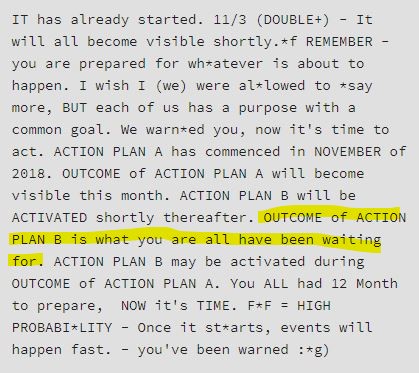the strange reality of strict calvinism is that it makes a mockery of God's claims to hate, abhort, or even be theoretically opposed to evil
Because we all know that God's response to the Flood was, "I REALLY liked that, it was AWESOME, it satisfied my will and purposes to obliterate my creation!"
1) If God knew how things would go, exercising his sovereignty in that way is only a little different
2) Evil begins BEFORE man's fall! Satan fell first! We know little about this, but locating first-evil in *human* free will is an error.
The key point is simply that the origin of evil is certainly *before* "original sin."
This is formally equivalent to the question, "Could the Father discontinue the existence of the Son?" since both are questions about if God has sovereignty over His own attributes.
Who can say! Not even the Son was told the day or the hour! But if God is taking His time there must be a reason. We can't reason about what that may be, as God has not revealed it.
.... love me all my Presby family and friends (literally both sides of the family and many of my best friends!)....
.... and your theology is interesting...
.... but very, very, very wrong.
More from Lyman Stone 石來民
Hogan Gidley: Trump is "the most masculine person to ever hold the White House as the president of the United States" https://t.co/fcoYWyaEhz
— Eliza Relman (@eliza_relman) January 11, 2021
Or Teddy Roosevelt. Or Dwight Eisenhower. Or Andrew Jackson. Or Abraham Lincoln. Or George Washington. Or Zachary Taylor. Or any of numerous presidents who were honest-to-goodness battle-hardened warriors.
James Monroe fought the Hessians at Trenton and nearly died of wounds sustained there, then wintered in Valley Forge, then fought until Monmouth, then repeatedly tried to raise new regiments for the war until he went bankrupt doing it.
James Monroe, of the Era of Good Feelings, longest serving president of all time.... was in the boats crossing the icy Delaware.
Andrew Jackson was in a duel. He was shot in the chest right by his heart.
But he didn't go down. He stood there and, while bleeding out, steadily took aim and killed the dude who shot him.
Stone cold.
So first off, at this point the evidence is pretty clear that SSRIs and other anti-anxiety/anti-depression drugs truly don't do very much. Their average effects are beneath clinical significance, as I tweeted about here:
What's the best recent empirical assessment of SSRI/SNRI effectiveness which deals with heterogeneity and long-term effects in a plausible way?
— Lyman Stone \u77f3\u4f86\u6c11 (@lymanstoneky) December 4, 2020
Basically, the problem these drugs face is that while they actually see relatively LARGE effects.... but that placebos in those trials ALSO see large effects (and most untreated depression improves within a year anyways).
So basically you have this problem where:
1. The condition tends to improve on its own in a majority of cases
2. Placebo effects for the condition are unusually large
Which means the large crude effects of SSRIs get swamped.
So that raises two new questions.
1. (Not my focus here) Are we treating these conditions appropriately given their untreated prognosis is usually (though certainly not always!!) "goes away in a few months"?
2. Why are placebo effects so unusually large?
More from For later read
@Daoyu15 @lab_leak @walkaboutrick @ydeigin @Ayjchan @franciscodeasis @TheSeeker268 @angie_rasmussen
28. Before moving on to DARPA, let's look at DTRA:
— Billy Bostickson \U0001f3f4\U0001f441&\U0001f441 \U0001f193 (@BillyBostickson) July 31, 2020
A must read!
It is astonishing the number of pies they had their dirty little fingers poking into:
Note John Epstein and Kevin Olival from EcoHealth Alliance are key figures in DTRA:https://t.co/O4QwVWrm7m pic.twitter.com/cnNGZ7AApj
@Daoyu15 @lab_leak @walkaboutrick @ydeigin @Ayjchan @franciscodeasis @TheSeeker268 @angie_rasmussen
24. DTRA Network for Collection of Viruses
— Billy Bostickson \U0001f3f4\U0001f441&\U0001f441 \U0001f193 (@BillyBostickson) January 9, 2021
7. DTRA - Metabiota - One Health - Ecohealth
Bat Research Networks and Viral Surveillance: Gaps and Opportunities in Western Asia pic.twitter.com/SOqSSXF3pa
@Daoyu15 @lab_leak @walkaboutrick @ydeigin @Ayjchan @franciscodeasis @TheSeeker268 @angie_rasmussen
That is the key question
— Billy Bostickson \U0001f3f4\U0001f441&\U0001f441 \U0001f193 (@BillyBostickson) January 5, 2021
1. DARPA/DTRA use NGOs like Ecohealth or Metabiota to collect new pathogens
2. They are sent to US labs (Mailman, Rocky Mountain, Atlanta CDC, UNC, USAMRIID) for GOF work by Lipkin, Nichols, Rasmussen, Baric, Dension, Munster, etchttps://t.co/wqhHK7uZO6
@Daoyu15 @lab_leak @walkaboutrick @ydeigin @Ayjchan @franciscodeasis @TheSeeker268 @angie_rasmussen
1. I wonder why Dr. Angela Rasmussen is so so upset & full of almost palpable venom about a Hypothesis and a "What if" question by @nicholsonbaker8 in the @NYMag https://t.co/a6lxtJLpKR
— Billy Bostickson \U0001f3f4\U0001f441&\U0001f441 \U0001f193 (@BillyBostickson) January 5, 2021
Did I hear someone say "DARPA"?
Did I hear someone say "DTRA"?https://t.co/i27mpxJDw2 pic.twitter.com/x4X3QPnTMS




























